Québec Nickel Corp. Provides An Update Of Exploration Activities At Its Ducros Project, Abitibi, Québec
Ongoing work indicates the Ni-Cu-Co-PGE-Au mineralization at the Fortin Sill Zone is coincident with multiple geophysical features that extend more than 250 metres in strike extent
Vancouver, British Columbia, June 13, 2022 – Québec Nickel Corp. (CSE: QNI; FSE: 7lB; OTCQB: QNICF) (or the “Company“) is pleased to provide a summary of its ongoing 2022 exploration activities as well as its upcoming work programs at the Ducros Ni-Cu-Co-PGE-Au Project, 80 kilometres northeast of Val-d’Or, Québec.
Highlights:
- 1,750 metres drilled in eight holes at the new Fortin Sill Ni-Cu-Co-PGE-Au Zone, with over 4,600 metres completed in 16 holes for the Ducros project YTD.
- Drilling results in conjunction with ongoing data compilation suggests the disseminated, blebby and pseudo-net texture Ni-Cu-Co-PGE-Au sulphide mineralization at the Fortin Sill Zone is characterized by multiple geophysical signatures that extend for at least 250 metres in strike extent.
- A new drilling permit has been received from the Québec Government that will allow for the further evaluation and potential expansion of the Fortin Sill Ni-Cu-Co-PGE-Au zone.
- Additional field work programs have begun with an expanded Ducros Project team.
2022 YTD Diamond Drilling Program
Québec Nickel’s inaugural multi-phase diamond drilling program at the Ducros project began in mid-February, and to date has completed 16 drill holes for a total of 4,612 metres with one diamond drill. The Phase I drilling program was designed to test multiple Ni-Cu-PGE targets generated from a surface electromagnetic survey (ARMIT-TDEM) completed in 2020 by Abitibi Geophysics in addition to completing several holes designed to gain a better understanding of the local geology and to explore at depth within this portion of the greater Ducros property. These Phase I holes were successful in intersecting their intended targets, which comprised predominantly of variably conductive and magnetic intervals of sulphide +/- oxide facies iron formation hosted within mixed sequences of mafic metavolcanics, metasediments and the occasional felsic intrusive unit. Of note, several of the Phase I holes encountered long core intervals of ultramafic rocks, interpreted to be strongly altered pyroxenite and dunite intrusive units (sills). Summary assay results for the Phase I drilling are presented in Table 2.
The Phase II drilling program began in April at the Fortin Sill Ni-Cu-PGE showing and started with hole QDG-22-09, which was designed to verify the results returned from Golden Valley Mines Ltd.’s historical hole GCF-08-07. Assay results from QNI hole QDG-22-09 improved upon the historical drill intercept in terms of both overall grade and core length (see May 16, 2022 news release for more details). Two additional holes were completed from the same set-up as QDG-22-09, namely QDG-22-10 & 11, to test for the continuity of the Ni-Cu-Co-PGE-Au mineralization on section with QDG-22-09 and GCF-08-07. This drilling was successful at expanding the mineralized zone at Fortin Sill on section to the southwest (see June 6, 2022 news release for more information). These encouraging results prompted the drilling of additional holes from the same location in efforts to determine the continuity of the Ni-Cu-bearing sulphide mineralization at Fortin Sill in three-dimensions (Table 1, Figure 2). Drill collar information for Phase I and II holes are presented in Table 3.
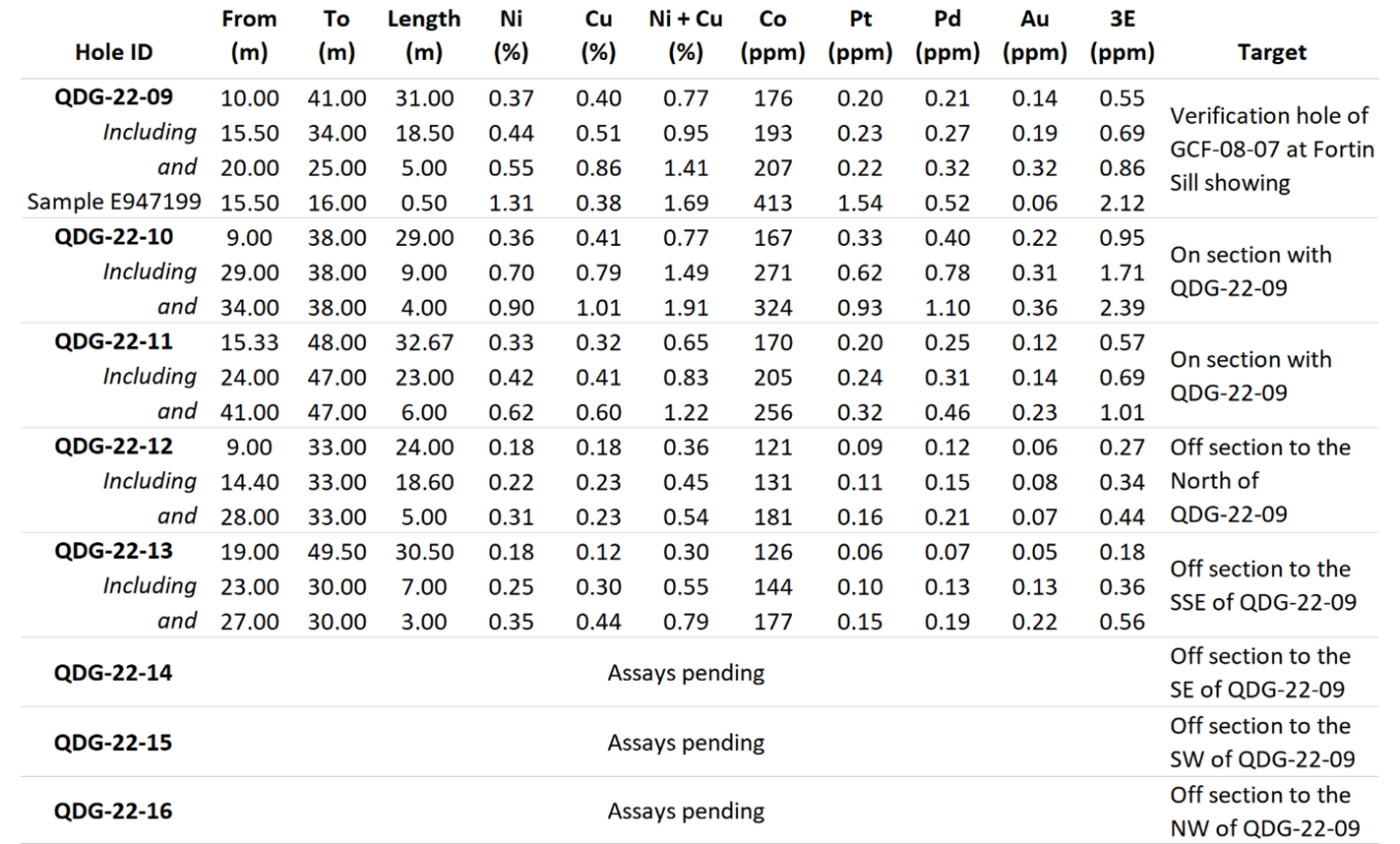
Potential Size of the Fortin Sill Zone
Ongoing compilation of historical exploration works and their integration with current datasets has shed some light on the potential size of the Fortin Sill Ni-Cu-Co-PGE-Au zone. In December 2005, an Induced Polarization (I.P.) survey at the Fortin Sill Target area was completed by Géophysique TMC with the data subsequently interpreted in March of 2006 by Lambert Géosciences Ltée. (Québec Assessment Report GM 62408). This work was completed on behalf of Golden Valley Mines Ltd. and consisted of a dipole-dipole resistivity + chargeability survey using a dipole “a” spacing of 25 metres along 100 metre-spaced NE-SW cut grid lines. The survey grid spanned from ~200 metres northwest of the original Fortin Sill mineralized outcrop showing to ~1,000 metres to the southeast (Figure 1).
The historical I.P. survey data outlines a well-defined chargeability anomaly, the axis of which begins approximately 100 metres northwest of the original Fortin Sill Ni-Cu surface showing, trends directly over the now stripped mineralized bedrock exposure, and extends for an additional 250 metres to the southeast (Figure 1).
Golden Valley Mines Ltd. followed-up on this geophysical work by completing two drill holes to test the I.P. chargeability anomaly (Figure 2). As summarized in past news releases and the Ducros Project 43-101 Technical Report (May, 2021), hole GCF-08-07 was collared on the Fortin Sill Ni-Cu showing and intersected 0.82% Ni + Cu and 0.65 g/t Pt-Pd-Au over a core interval of 20.7 metres. Hole GCF-08-06, collared approximately 35 metres to the southwest of hole GCF-08-07, was drilled to test the southern strike continuation of the I.P. chargeability anomaly and returned 0.32% Ni + Cu and weakly anomalous gold values over a 33 metres core length within what the drill logs describe as an olivine gabbro; assay values for PGE’s are not included in the assessment report drill log for hole GCF-08-06 (Québec Government Assessment report GM 65886). The drill collars for the Golden Valley holes have not been located in the field as the casing was pulled from the BQ-diameter holes.
In addition, data from the recently completed 2022 VETMTM electromagnetic-magnetic survey define a subtle but distinctive magnetic high response that is coincident with the central axis of the historical I.P. chargeability anomaly and the Fortin Sill Ni-Cu mineralized stripped outcrop area (Figure 2). Project personnel interpret the coincidental nature of the two geophysical anomalies at the Fortin Sill Target to be a direct response to the amount and style of sulphide mineralization and/or host rocks known to occur at surface and from historical and recently drilled core. Future drilling will focus on testing these geophysical features along strike to the northwest and southeast of the Fortin Sill Zone.
As such, a permit to complete additional drilling at the Fortin Sill target has recently been received from the Québec Government that will allow for the creation of multiple new drill pads adjacent to and along the interpreted strike of the Fortin Sill Ni-Cu-Co-PGE-Au Zone. The continued drilling of this target will commence once the necessary access trails and drill pads have been cleared.
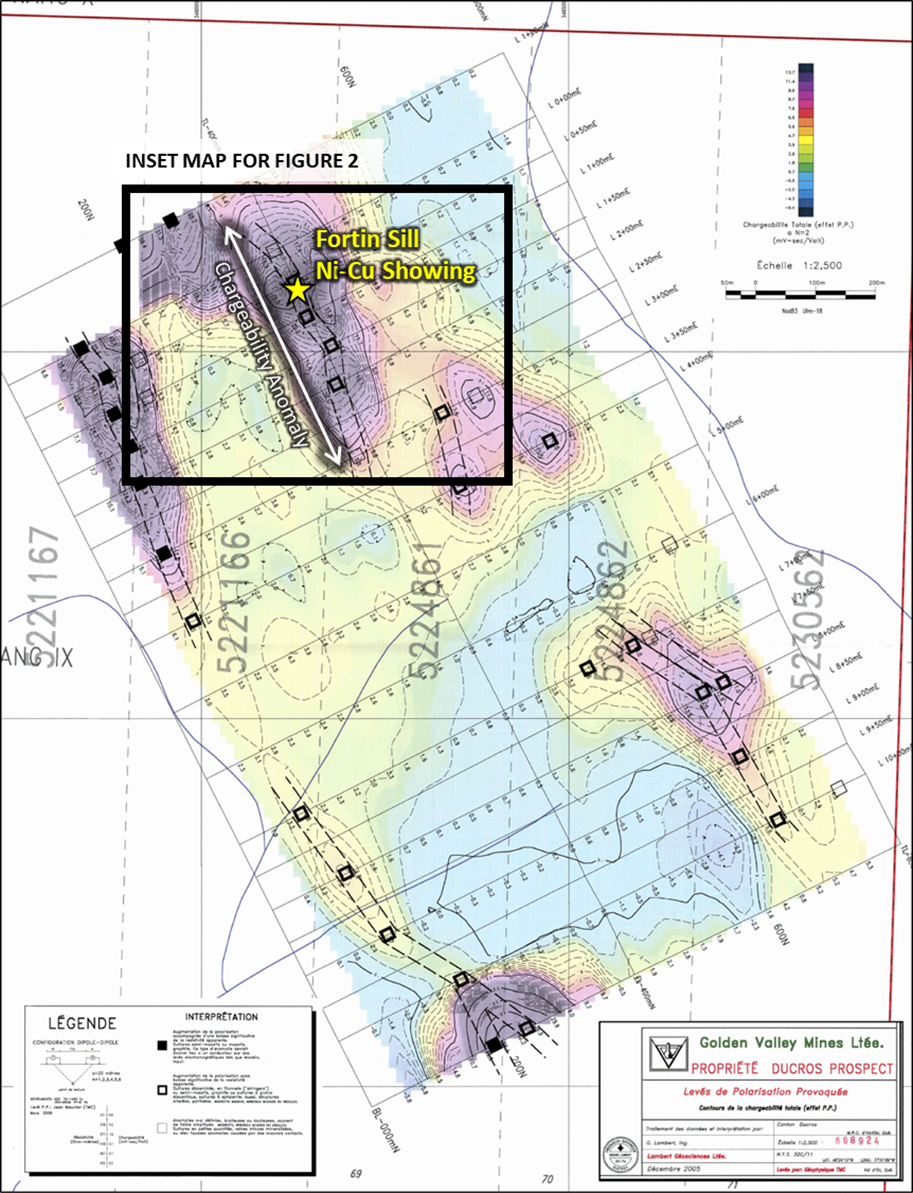
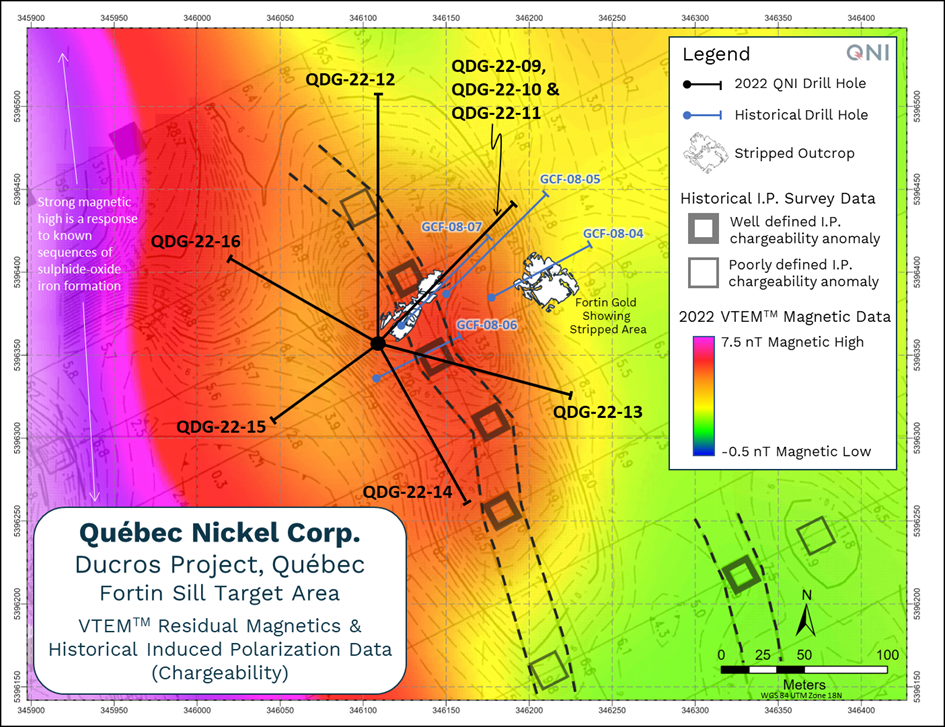
Ongoing and Future Work Plans at Ducros
QNI has recently expanded its Val-d’Or-based Ducros Project team which will allow for the start of additional field-based work programs. Some of the planned summer field programs and new exploration data acquisition projects include:
- Channel sampling of the Fortin Sill discovery outcrop:
- Systematic channel sampling across the entire mineralized Fortin Sill stripped outcrop exposure;
- Property-wide biogeochemistry survey:
- A Black Spruce bark sampling program, which will cover the entire >15,000 Hectare Ducros property, and will start with a tightly spaced orientation survey over the Fortin Sill Target Zone;
- High-resolution satellite imagery:
- The collection of 50 cm resolution satellite imagery over the entire project area;
- Fixed-wing gravity survey:
- Collection of airborne gravity gradiometer, gravity and magnetic data over the entire Ducros project area;
- High resolution UAV magnetic surveys over specific targets:
- A high-resolution 250 line-kilometer UAV magnetic survey over the Fortin Sill target area was completed in May; the data are currently being processed. Additional detailed flight blocks will be flown over specific targets this summer to help refine final drill targets.
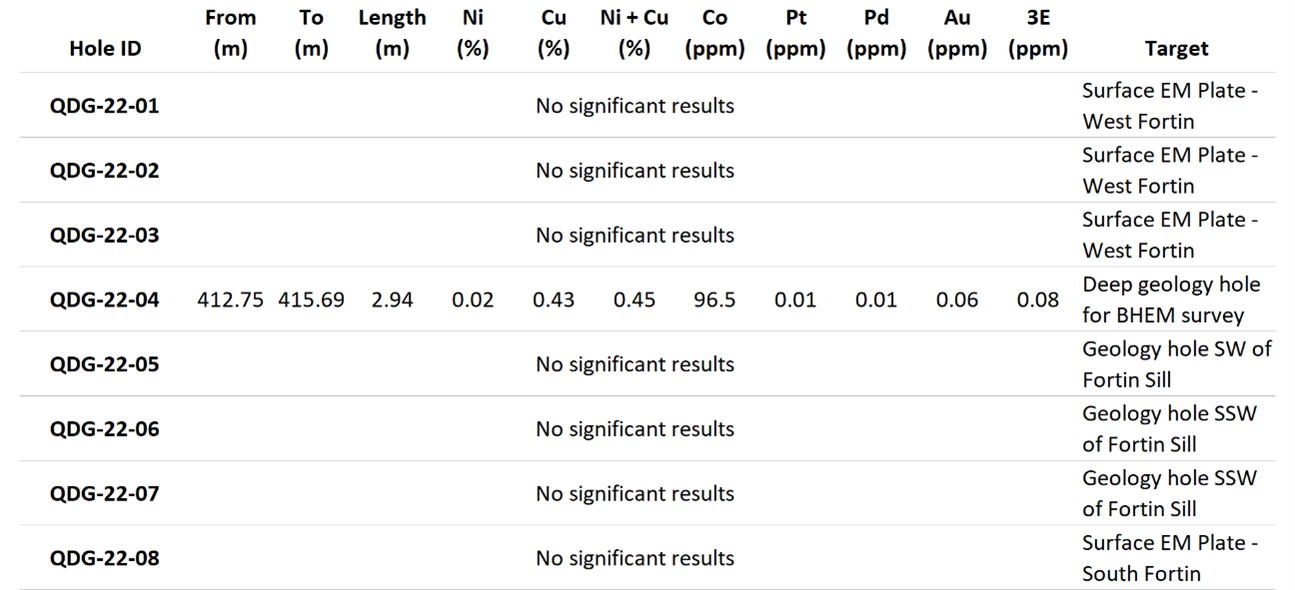
(1) Reported assay intervals are sample length weighted.
(2) The true width of the mineralized intersections are not known due to insufficient information.
(3) 3E = Pt+Pd+Au
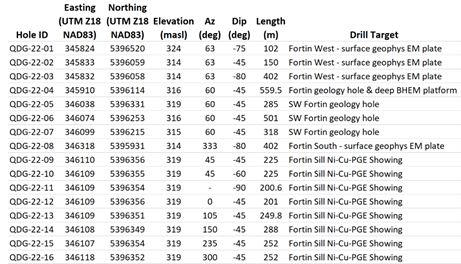
Québec Nickel at PDAC 2022
Québec Nickel will be exhibiting at PDAC 2022, and the Company invites conference attendees to visit the QNI booth #3239 at the Investor Exchange in the South Building of the Metro Toronto Convention Center from June 13 to 15, 2022. Company representatives will be on hand to discuss the results of the ongoing drilling program as well as our work plans for the rest of the year at the Ducros Project.
Core Processing & QAQC
Québec Nickel has implemented a quality assurance and quality control (“QAQC”) program for its Ducros project drilling program, to ensure best practice for logging, sampling, and analysis of its drill core, and includes the regular insertion of geochemical blanks and multiple Ni-Cu-PGE certified reference material standards (CRM’s) into the sample stream.
Drill core is collected by Ducros project personnel from the drill daily and transported to QNI’s core logging facility in Val d’Or in secured core boxes. Logging is completed on a laptop and data are captured using fit-for-purpose computer software.
Core destined for geochemical analyses is identified and labeled by core logging geologists and is then sawed in half by a diamond blade saw using clean uncirculated water. One half of the NQ-diameter core sample is placed in a labeled and secured sample bag. The remaining half of the core sample is returned to their core box for archiving. All core samples are transported from QNI’s logging facility to AGAT Laboratories’ sample preparation facility in Val-d’Or in secured and numbered rice bags by project personnel.
AGAT Laboratories is accredited to the ISO/IEC 17025:2017 and ISO 9001:2015 standards. Analysis for precious metals (gold, platinum, and palladium) is completed by Fire Assay with an ICP-OES finish while analyses for nickel, copper, and 41 other elements are performed using AGAT’s 4 Acid Digest – Metals Package, with an ICP-OES finish.
QUALIFIED PERSON
Gary DeSchutter, M.Sc., P.Geo., Vice-President of Exploration for Québec Nickel Corp., and a Qualified Person (“QP”) as defined under National Instrument 43-101 (“NI 43-101”), has reviewed, and approved the scientific and technical content of this press release.
ABOUT QUEBEC NICKEL CORP.
Québec Nickel Corp. is a mineral exploration company focused on acquiring, exploring, and developing nickel projects in Québec, Canada. The Company has a 100% interest in the Ducros Property, consisting of 280 contiguous mining claims covering 15,147 hectares within the eastern portion of the Abitibi Greenstone Belt in Québec, Canada. Additional information on Québec Nickel Corp. is available at www.quebecnickel.com.
The CSE has neither approved nor disapproved the contents of this news release. Neither the CSE nor its Market Regulator (as that term is defined in the policies of the CSE) accepts responsibility for the adequacy or accuracy of this release.
On behalf of the Board of Directors
David Patterson
Chief Executive Officer and Director
1 (855) 764-2535 (QNICKEL)
info@quebecnickel.com.web2.sogetel.net
CAUTIONARY AND FORWARD-LOOKING STATEMENTS
This news release includes certain statements that may be deemed “forward-looking statements”. All statements in this news release, other than statements of historical facts that address events or developments that the Company expects to occur, are forward-looking statements. Forward-looking statements are statements that are not historical facts and are generally, but not always, identified by the words “expects,” “plans,” “anticipates,” “believes,” “intends,” “estimates,” “projects,” “potential” and similar expressions, or that events or conditions “will,” “would,” “may,” “could” or “should” occur. Although the Company believes the expectations expressed in such forward-looking statements are based on reasonable assumptions, such statements are not guarantees of future performance, and actual results may differ materially from those in the forward-looking statements. Factors that could cause the results to differ materially from those in forward-looking statements include market prices, continued availability of capital and financing, and general economic, market, or business conditions. Investors are cautioned that such statements are not guarantees of future performance and that actual results or developments may differ materially from those projected in the forward-looking statements. Forward-looking statements are based on the beliefs, estimates, and opinions of the Company’s management on the date the statements are made. Except as required by applicable securities laws, the Company undertakes no obligation to update these forward-looking statements if management’s beliefs, estimates, opinions, or other factors should change.

